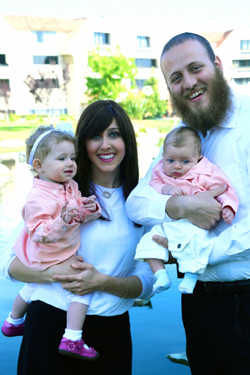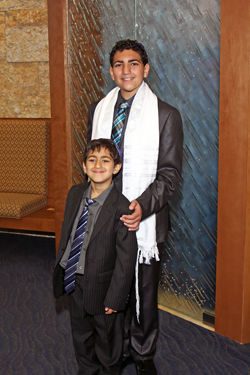By Donald H. Harrison


Rabbi Rafi and Chaya Andrusier with children Yehudis and Isaac (Photo: Chabad of East County)
SAN DIEGO – At first I thought that the San Carlos Recreation Center was an odd location for Chabad of East County to have a reading of the Ten Commandments followed by a Shavuot dairy meal on Wednesday, June 4.
But I was wrong.
I realized my mistake during a break in the prayer service when I traded curious glances with teenagers in shorts who passed by the open door of our mehitza-divided meeting room. They were at the recreation center to meet the basketball coaches for whom they would be trying out for a summer league that includes players from the San Carlos neighborhood of San Diego.
At the teens went through their paces for the coaches, we heard once again the instructions from the One we might call the “Eternal Coach” on how we should live our lives: 1) We should not worship other gods; 2) We should not make graven images; 3) We shouldn’t take HaShem’s name in vain, 4) we should observe the Sabbath, and keep it holy 5) We should honor our parents; 6) We should not kill; 7) We should not commit adultery; 8) We should not steal; 9) We should not bear false witness; 10) We should not covet.
Perhaps, on the nearby basketball court, coaches were offering some of the same lessons, I wondered.
“Listen up, kids, as important as this game of basketball is, winning is not everything—in fact, it is far from it,” a coach might have told them. “Winning is a false god—a Golden Calf, if you will—to which misguided people sacrifice their ethics and their humanity. That’s not going to happen here. We are going to practice, practice, practice our fundamentals and team work, so that we can play hard, and by the rules. We will always try to do our very best, and we’ll try very hard to win. But we are going to be respectful to each other, to the players and coaches on the other team, to the referees, and to all those people, including our mothers and fathers and grandparents, who are watching from the stands.”
“You’ve heard the commandment ‘thou shalt not steal!’ – well that means that you must not do anything outside the rules that could give our team an unfair advantage,” the coach might continue. “No tying to distract an opposing player who is making a free throw shot by calling out insults. But stripping the ball from an opposing player who is dribbling it too high, that’s not really “stealing”—even though the sports writers call it that — that’s intercepting, and it’s an important part of the game. So don’t hesitate on that score.
“I expect us to be honest at all times. Don’t fake an injury or say that another player fouled you if he didn’t, simply to try to get an unearned shot at the free throw line. We don’t bear false witness. And, in the unfortunate event that we should lose a game because the other team was better prepared or better drilled than us, we don’t complain, or argue against the result. We congratulate them on their victory, learn from our mistakes and move on. We shall not covet.”
*

Rabbi Raphael Andrusier retold to the congregation the midrash in which it was said that HaShem asked the People of Israel who would guarantee the sanctity of the Torah if it were given to them. The people answered that the merit of their forefathers—Abraham, Isaac, and Jacob among them – should be sufficient guarantee, but HaShem said what happened in the past is insufficient. Then the people understood that their children should be the guarantors of the Torah.
In a very personal way, this midrash became meaningful to our family when Rabbi Andrusier awarded the fourth Aliyah– the honor of pronouncing the blessings to be said immediately before and after the reading of the actual Ten Commandments. He looked at me, I looked at my 13-year-old grandson, Shor, and the rabbi realized how fitting that would be. Although Shor is now a bar mitzvah and therefore an adult for the purposes of Jewish ritual, he was also the most recent person in the recreation center to have celebrated becoming a bar mitzvah (his portion was Kidoshim). So when Shor nervously but proudly stepped up from the congregation for his Aliyah, it reflected the teaching of the midrash. Our child—or in this case, a grandchild – symbolically served as a guarantor of the Torah.
I knew as Shor chanted the blessings that, on the other side of the mehitza, my wife Nancy was shepping great nachas over the honor bestowed upon our grandson. His brother Sky, 7, watched Shor very carefully, and later, at a dairy dinner, lovingly prepared by the rebbetzin, Chaya Andrusier, when someone at a long picnic-style table asked Sky when he would have his bar mitzvah, he unhesitatingly—and with a touch of excitement – answered “six years!”
As for Shor, he had the pleasure of shaking hands with several men in the congregation, who heartily wished him “Yasher Koach!” meaning “continued strength,” which is a customary way to congratulate someone who has been called to the bima to lead the congregation.
*
Harrison is editor of San Diego Jewish World. He may be contacted via donald.harrison@sdjewishworld.com